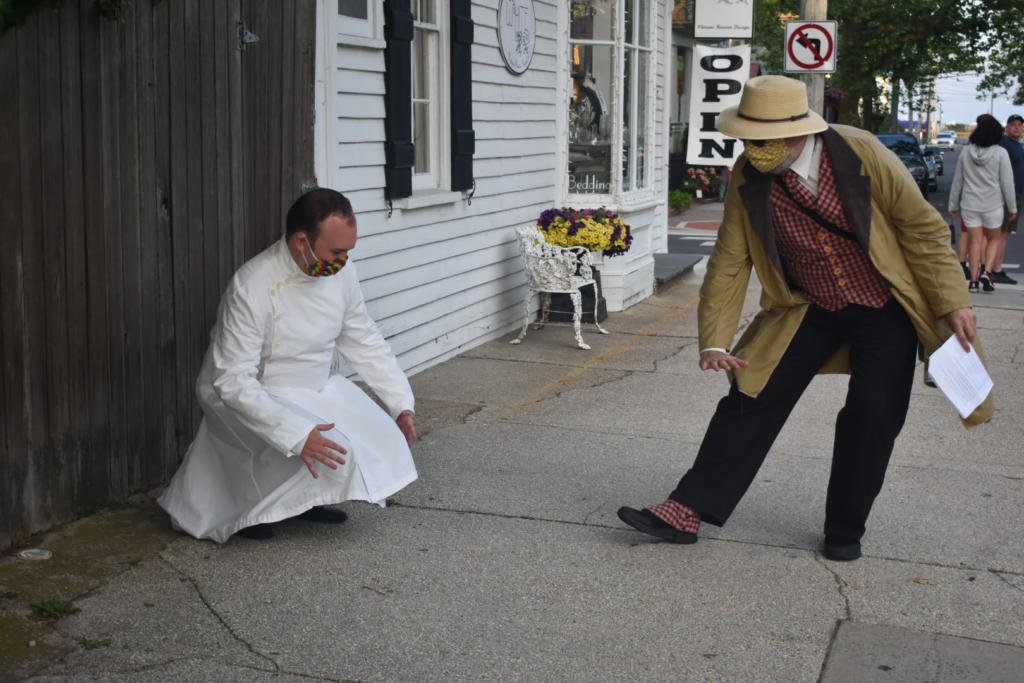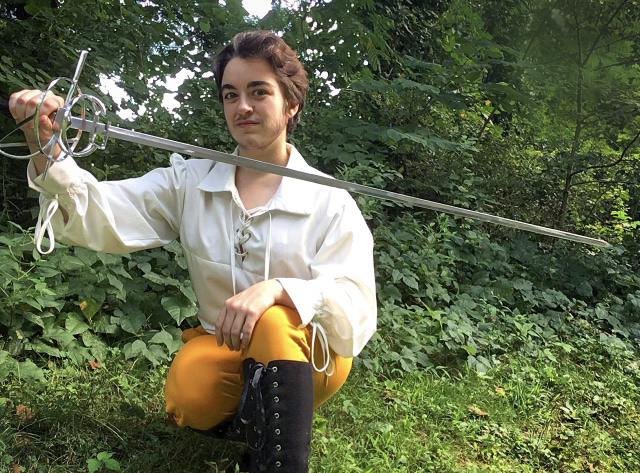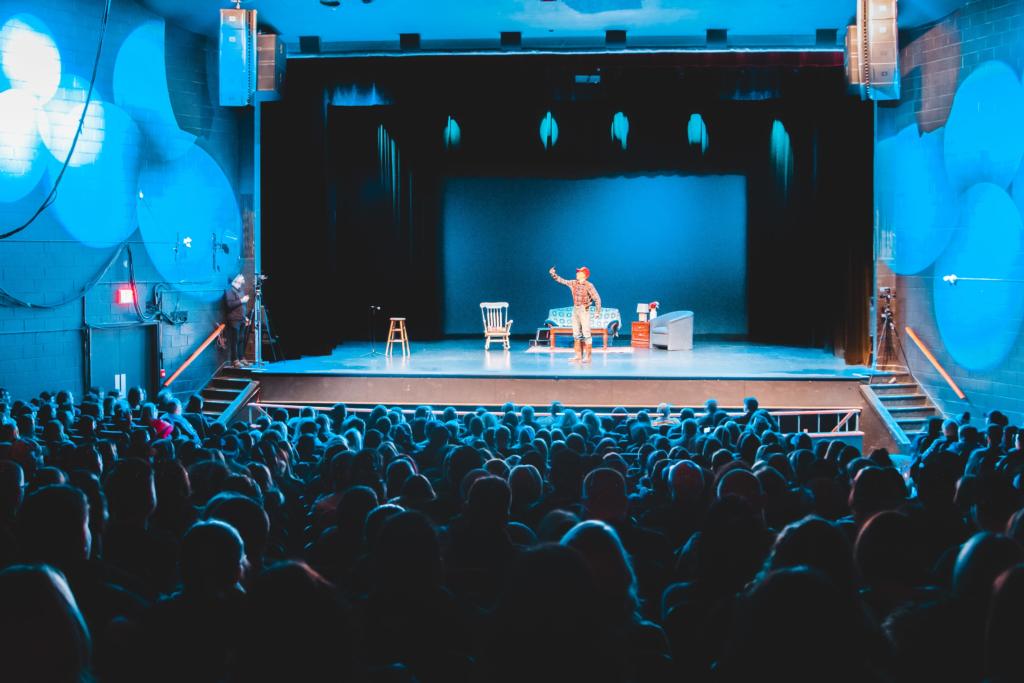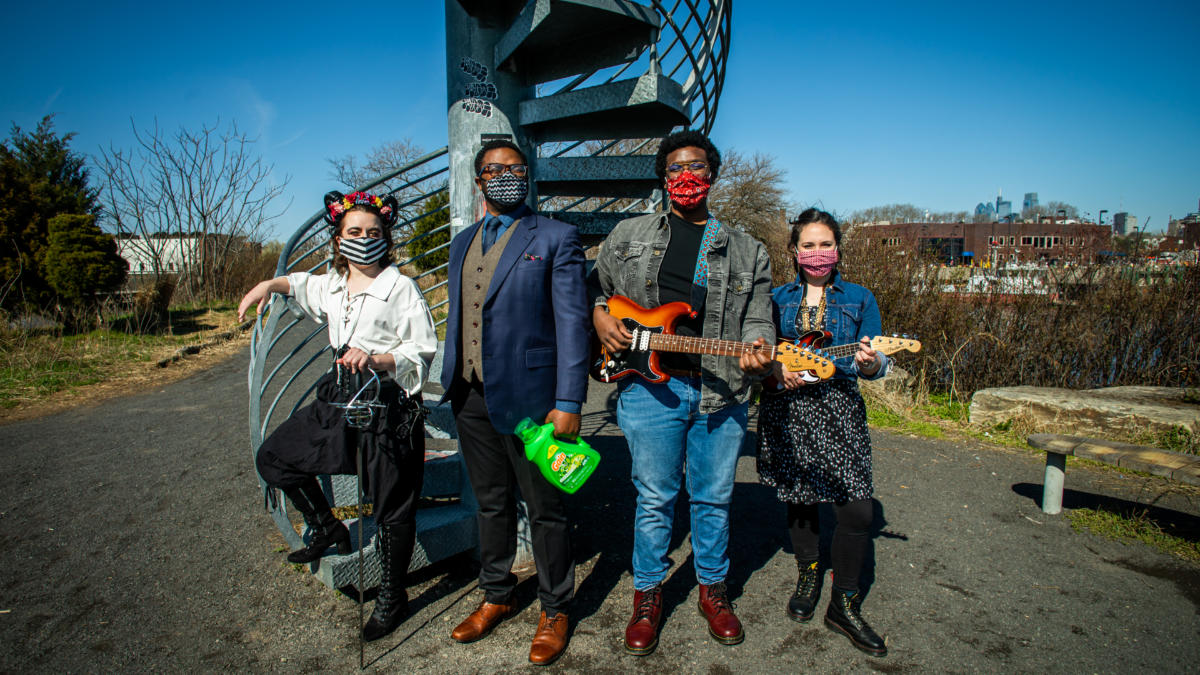From an aesthetic and a financial viewpoint, if you’re a theater professional – acting, directing, writing, producing, tending to multiple design elements and backend staging – between March 2020 and March 2021, you’ve been out of luck.
If you’ve been a theater-loving audience participant during that time, you’re out of options.
Save for fleeting virtual presentations and presenters in Philly who kept the fires burning (e.g. Wilma Theatre, Theatre Exile), since the pandemic’s start – and with it, a small semblance of a cash flow – this area’s theatrical companies have chilled, its stages have gone dim, with many of its independent artists gone unfunded.
Or, as put by Philadelphia playwright Jacqueline Goldfinger in PW’s COVID-19 Year in Review: “My business is gone. There’s nothing left. There’s been no live performance for a year; we won’t see full slates from most theaters until 2022. That’s two years without work. Rebuilding seems a Herculean task, but it’s one I know all theater artists and companies are facing.”
After a year of having gone dark, however, with April’s warmth comes needed light and energy.
There is, thankfully, funding possibilities like Art Works’ $3 million grant program for emerging BPICOC community organizations and emerging artists (submissions are due by April 23). There is the proposed “Illuminate the Arts” program from the city’s Office of Arts, Culture and the Creative Economy with $1.3 million to grant. There’s been Theatre Philadelphia’s Artist Relief, available to those in need during COVID. There’s the #SaveOurStages’ relief fund, earmarked for live musical venues, with some of its monies diverted to theater. Who knows how and when cash will be dispersed, but it’s a hurdle with a possible win.

Though infection numbers are rising, organizations such as the Kimmel Center are making plans for autumn’s return to the live theater stage for mainstream favorites such as Hamilton, Dear Evan Hansen, and an impressive array of one-time Broadway hits. The catch? A slickly slid-under-the-door extra cost – a mandatory $1,000 donation for access to hundreds of “platinum circle” seats, not counting the price tag of the tickets themselves.
In the immediate, and affordably so, is the biggest news of the theater season – beyond the fact that there will be a season – the fourth annual Philly Theatre Week from April 22 to May 2.
“I wasn’t sure it would happen,” said Theatre Philadelphia’s recently-installed Executive Director LaNeshe Miller-White.
Yet, here Miller-White was, having gathered together 64 theaters and arts organizations back to their stages, for an 11-day event featuring 72 virtual and in-person theater presentations – many companies (such as Bucks County’s Without a Cue) of which make 2021 their debut with Theater Week and Theatre Philadelphia.
Miller-White started running Theatre Philadelphia in August 2020, a COVID-born chieftain who made 2021’s Theater Week her first as the umbrella organization’s exec director.
“I’ve participated in Theater Week with the company I run, West Philly’s Theater in the X, so I have that experience,” she said.
“As Theater Week, along with the Barrymore Awards, are our flagship events – spotlighting what Philly theater does – these showcases were of utmost importance when I started as executive director.”
Important, yes. But, Miller-White also knew that Theater Week’s usual start time of February was out of the question when it came to the Two Cs – COVID and getting people to come out in the Cold when it came to possible outdoor theater ventures.
“It’s easier to coax people into outdoor settings with warmer weather.”
To have a new thing, now, which previously existed – that meant a lot to Theatre Philadelphia’s fresh director.
“That hasn’t been the case with everything during COVID, as many restaurants and clubs closed during the pandemic.”

Hence, Theater Week 2021 only began to hatch with the thought of spring in the air, and live stagings in roomier settings, to go with the continued necessity of digital/virtual offerings.
“There are things you can do outside that you can’t indoors,” said CJ Higgins of The Hum’n’bards Theater Troupe, whose weapon demonstrations and fire-dancers-filled #Knightlife Renaissance Faire – live but virtual for TW2021 – wouldn’t work in smaller theaters.
(It’s interesting to note that while Miller-White’s Theatre Philadelphia is all about marketing local stages as a unified brand with TW2021’s productions being either free or ranging between $15 and $30 tops – her Theater in the X will not benefit from #SaveOurStages money as they do not have a single stage, but instead operate outdoors. They did get round one PPP loans and will receive diversity-designated monies from the Black Seed Fund for theaters of color).
Miller-White enthused about how TW2021 would feature in-person, live theater events to go with its virtual stagings, readings, classes, archival footage-filled showcases, She laughed that there was “even one theater event by mail” – Frauenschlläechterei by Hella Fresh Theatre about a German lawyer attempting to be a star maker in 1933 Hollywood – which came to its audiences in mailed installments, culminating in a performance in your home).
Mostly though, Miller-White was proud to report how companies and artists who have – and haven’t done – theater in Philadelphia within the last year were throwing in their two cents for the love of the game.
Here, then are several theater artists participating in 2021 Theatre Week, and the messy melee that was the missing 2020. (Tickets for shows and information www.phillytheatreweek.org.)
EgoPo Classic Theater’s Artistic Director Lane Savadove began 2020 by shutting down its production of Curse of the Starving Class by Sam Shepard days before opening, as well as losing approximately 70 percent of their usual ticket sales.

Rather than wallow, Savadove and EgoPo moved to make art.
“Artistically, spiritually, it was important – helping the company survive Hurricane Katrina, which was catastrophic for us, gave me a different perspective,” said Savadove of EgoPo’s 1993 start in New Orleans before moving to Philly in 2005.
“I see even the most challenging moments as opportunities for discovery.”
Part of the discovery process found EgoPo working smaller, more intimately, and more experientially-centered, while simultaneously finding different, innovative ways to experience live theater safely.
“Each would re-envision the very nature of theater…Slowly adding more live interaction to mirror our process of living through this pandemic.”
EgoPo began by connecting with audiences through the mailing of letters and art objects (Emily), then through social media (Underground), then having audiences come to their backyards and peer through their windows (the just-ended Rockaby).
“Rockaby was moving and meaningful, and its sense of human connection was truly profound – I will never forget the audiences’ reactions upon leaving the show. Now we will finally share a space together communicating through a car window with Nocturne for Theater Week, but in the same space,” said Savadove.
Nocturne embraces a sense of community and the fun of participating in an interactive event, as well as a gradual sense of coming out of our caves after a long hibernation and taking little baby steps of sharing space together.
“It will be exciting but also tentative,” said Savadove of Adam Rapp’s 2001-penned Nocturne and its meditation on how we can recover from catastrophic losses and dramatic disruptions.
“EgoPo’s staging in an abandoned nighttime parking lot highlights the weapon of destruction that sits at the core of the play: A car. In this immersive environment surrounded by the sounds of Amtrak train tracks, the audience sitting in their cars become not only observers, listening on their FM car radios, but active protagonists in our story as they shine their headlights directly onto the action of the play.”
Savadove was immediately bowled over by Rapp’s play, even though it didn’t really fit EgoPo’s mission.
“At the start of the pandemic, my mind went to drive-in theater, but I didn’t want to just use the form as a poor substitute for live theater. I wanted something that would be better, that would be woken up, by using the drive-in form. Then, it hit me: in Nocturne cars are at the very core of the piece – they are the protagonists. What if we could amplify this by letting cars be the literal and figurative vehicle for performance?”
Savadove says audiences will receive GPS coordinates of a parking lot upon purchasing their ticket, make their way into North Philly, “arriving at the Sedgley Lot as the sun is going down.” Upon entry, audience members get envelopes that contain directions for experiencing the piece, along with portable FM radios with headphones and flashlights.

“Cars are arranged into a massive semi-circle with lawn chairs brought by audiences scattered between – all safely enclosed and socially distanced. On cue, all the headlights go on illuminating this powerful, unforgettable, heart-wrenching tale.”
While a company such as EgoPo found ways of doing theater sporadically during the pandemic, Inis Nua Theatre – Founder and Artistic Director Tom Reing’s Company dedicated to bringing Philly contemporary, exciting plays from Ireland, England, Scotland and Wales for over 15 years – did very little.
“Inis Nua cancelled our third production of Folk and our Pop Up Play in a Pub, Lemons, Lemons, Lemons, Lemons, Lemons at Fergie’s Pub for the end of the 19-20 season,” said Reing.
“We planned a three-show Mainstage season with two pop-up Plays in a Pub for 2020-2021. Instead, we offered a free, virtual reading series.”
As Inis Nua is a subscriptions-heavy company, they lost that funding throughout 2020, but made up for it, somewhat, through donations to attend the free reading series, along with foundations giving funds in this tough time.
For its run at TW2021, Reing directs a streaming Welsh play, Siân Owen’s How to Be Brave – a one-woman show about a mother on an odyssey in her hometown of Newport, Wales.
“It’s funny, ultimately joyous. I picked it after seeing 2019’s Edinburgh Fringe, and rather than be about COVID or the year we’ve been through, its positive message is about the bravery in all of us,” said Reing.
“It may be the play we need right now. “
Filmed at Inis Nua’s home at the Drake complex, for safety protocols, the only people in the theatre were the actress, a director of photography and, occasionally, a costume designer.
“Everything, from rehearsals to film shoot, I directed from my computer at my house. A new way to direct, for sure. It was definitely weird and not how I want to direct always, but it was for safety’s sake…
“I always sign off my messages to the audience in emails, ‘We will meet again in the theatre soon.’ So, I am hopeful.”
Though her work onstage throughout 2020 was stalled and stilted, Brenna Geffers’ creations through the company she co-founded with Thom Weaver, Die-Cast – centering on changing the relationship between visitor and space via experimental immersive performances in nontraditional spaces and digital storytelling – seemingly thrived.
“Looking at my phone’s Google calendar, I was supposed to be starting rehearsals for a new piece this week,” said Geffers.
“My calendar tells me that I was to have another show up and running right now. I was supposed to travel to Texas, New York, Indonesia, Miami, and Provincetown to build new pieces this past year. It’s still possible that all of these shows will happen in the future, that they are ‘postponed’ and not ‘canceled,’ but who can say?”
Last spring was hard for everyone, but, while watching work disappear, Geffers also watched her cash vanishing.
“I had no idea how I was going to make any money. I went through my savings this past summer because I had zero income. I am often an adjunct teacher for different university theatre classes and even those dried-up due to low enrollment. At this point, I still don’t know if I will have any classes in the fall…You learn how to live through a feast and famine type of schedule, so maybe that helped get me through this last year – both economically and philosophically. But it feels very much far from over and I still don’t know how – or if – I am going to make it work.”
Still, work she did, immediately upon COVID’s introduction to the theater world. Along with pieces created for companies in Seattle and Miami’s South Beach, Die-Cast – which had already crafted a full-length digital piece for 2019’s Philly Fringe Fest and were used to creating work remotely – was prepared to pivot to fully digital work. They bought mics and immediately gave them out to acting folks. They released a digital experiment that used YouTube videos, Tik Toks, fake Instagram accounts, audio files, and quizzes all embedded onto a single site. They developed the radio element of Die-Cast, the 2X2L Programme, and through that worked with the Wilma on their Is God Is.
“That’s an example of one of the surprising elements of this time: We collaborated with new companies that we would never have worked with in “normal” times,” said Geffers.
For TW2021, another of Geffers works that she co-created and designed with the Wilma, Expired, will be re-released (“with Ross Beschler and members of the Wilma Hot House”) as well as premiering a Die-Cast piece, Dispatches From Gloria.
“With Expired, I designed and created the website, and I am really excited that people will be able to explore it. Like Dispatches From Gloria, it is also a digital immersive piece and, like Dispatches, is very much an experiment in digital storytelling.”
Dispatches From Gloria is a collage of work created for the Discord platform with videos, music, spoken word, visual pieces and games that lead visitors on an episodic journey.
“The different pieces use the January 6 storming of the Capitol as a jumping-off point, or rather, it wonders what happens after an insurrection,” noted Geffers.
“I have zero issues with a good, ‘old-fashioned’ Zoom play. But the idea of learning a new platform was exciting the same way that getting into a new physical space is exciting. For Die-Cast, that’s what it is all about; experimenting with and filling new spaces. So the space of Discord helps define the content we create for the piece. Discord was originally intended for gamers, and we have a lot of pieces that incorporate gaming.”

With Die-Cast pro-technology and pro-internet – also an element of Dispatches From Gloria – Geffers wants visitors to feel safe coming into a platform that they may not be familiar with.
“So if coming to a Discord piece feels intimidating or tricky, I promise you, it won’t be. The internet is an amazing tool and it belongs to you. Come play with it alongside us.”
Traci Connaughton, Executive Director of the Bucks County-based Without A Cue Productions, is using her debut into the Theatre Week/Theatre Philadelphia fam to launch her company’s work in Philly, Old City in particular.
Before this, however, there’s COVID-19 2020: One where actors, production staff and in-house mystery writing team were gearing up for more than 500 performances throughout the Philly/Bucks/New Jersey region alone.
“Our profit for just 10 weeks in Cape May would have been $120,000,” said Connaughton with frankness.
“That was just the one venue. All told, we were on track to gross $600,000 in 2020, more if we had maxed out the seats.”
After several weeks of laying on the bathroom floor, crying, and maxing out unemployment checks, Connaughton applied for, and got, pieces of a disaster loan (“but the money didn’t show up until May”), laid off her entire staff, came up with a good idea for a Zoom party that was part theater/part online mystery game.
“By April 2020, we had written a whole mystery, built a guest access website with more than 100 graphic, video, and PDF files for the mystery, tested it six times, trained 10 actors – we need two per party – they purchased new laptops, green screens and lighting systems to set up studios in their homes so that they could run the parties, and had our first paid party. In April alone, we performed 53 of them. Financially, it didn’t do much for us – we spent half of what we made in advertising and the rest I ended up paying to the actor who helped me build the games – but we felt really good about at least doing something beyond just washing off our groceries. And our audiences loved them.”
As Connaughton didn’t want to lose their summer season in Cape May, she pitched a second idea of walking tour Victorian murder mysteries with actors and guests as distant as they needed to be, and that worked.
“We utilized QR codes to provide additional clues: A closer look at the crime scene so that they weren’t getting too near the actors, a page of exposition information in the form of paper clues like newspaper articles and the like, and a clue at each stop. We purchased personal amplifiers so that the actors didn’t have to shout (and spread droplets – at that point we were still taking down the masks for the scenes) and then recorded historical information about Cape May to be played over the amplifiers in between stops.”
Philadelphia gets its first shot at a murderous Without a Cue Walking Tour with Murder By Gaslight, one where everyone stays masked or they die. Well, not literally.
“We thrive off of in-person interaction – this gives us a chance to do that while still keeping COVID at bay in our audiences. And the fun part for us is that we have found a way to integrate technology into the show to enhance the experience and make it immersive – a goal we have been reaching toward for a long time. Plus, everyone gets their Fitbit steps in. We get to perform and entertain – safely. And we get to give our audiences some light and laughter, which is our whole mission.”





